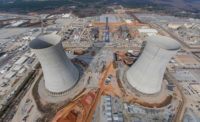Nuclear Power
Cost Concerns Raise Stakes on Westinghouse Nuke Projects

Construction work continues at Georgia Power’s Plant Vogtle project, as shown in this June photo of the Unit 3 nuclear island and turbine building.
PHOTO BY GEORGIA POWER
Despite grim reports about the costs to continue construction, the utilities leading nuclear-plant expansions in Georgia and South Carolina are continuing to negotiate with bankrupt contractor Westinghouse Electric Co. about taking over management of their respective projects.
Georgia Power on June 9 announced it had entered into a new agreement with Westinghouse’s parent company, Toshiba, aimed at transferring project management to the utility while affirming the value of Toshiba’s parental guarantee, at $3.68 billion.
In late June, SCANA Corp., parent company of South Carolina Electric & Gas Co., extended until Aug. 10 its agreement with Westinghouse governing the V.C. Summer nuclear project.
Within months, Georgia Power, South Carolina Electric & Gas and their respective state public-service commissions must decide whether to abandon the projects or keep building. Westinghouse, the contractor for both projects, filed for bankruptcy in March.
Back on June 8, though, testimony submitted by Georgia Public Service Commission staff and an independent monitor documented how construction continued to fall further behind schedule during 2016, the first year of Westinghouse’s role as lead contractor.
From April 2016 to April 2017, for instance, the joint testimony from Steven Roetger, lead analyst for PSC staff, and William Jacobs, the state’s independent construction monitor, noted that four critical-path construction activities experienced an average of 325 days of schedule delay. One milestone, completing construction of an Annex building, saw 396 days added to its target completion date.
Fluor intended its “Step Change Initiative,” enacted shortly after Westinghouse hired the firm to lead general construction activities, to forge a performance improvement within the first three months of 2016, with the goal of completing 2.3% of the project per month by the end of the year and as much as 3% per month by mid-2017.
Instead, from July through the end of December, Roetger and Jacobs testified that total project completion averaged 0.7% a month.
“The Step Change Initiative, while improving some functional areas, failed to achieve improvement in production and productivity,” the testimony stated. While Fluor implemented some improvements, those measures had “no significant impact on construction percent complete per month or on productivity.” Fluor declined to comment. Another criticism in the testimony was that the contractors continued to work without a fully integrated project schedule.
Even including Toshiba’s $3.6-billion parental guarantee, the Vogtle project’s economics grew considerably less favorable as a result of Westinghouse’s bankruptcy, according to testimony submitted by Philip Hayet, who has analyzed the project’s economics for its duration.
While noting that the guarantee would reduce Georgia Power’s costs to complete Vogtle construction, joint testimony by Hayet and co-analyst Lane Kollen stated their belief that risk associated with moving forward is retained by the utility and does not shift to ratepayers.
Recently, Commissioner Lauren “Bubba” McDonald floated the idea of Georgia Power foregoing collection of a nuclear-project surcharge from customers, a suggestion the utility rejected. A 2016 agreement also limits ratepayer impacts.
Hayet’s testimony stated, “The Vogtle Project is not economic under (several) hypothetical assumptions. Obviously, if ratepayers were responsible for less than the costs that Staff utilized in the analysis, the economics would improve. If rate-payers were responsible for more, then the economics would be worse.”
Some Georgia PSC commissioners have publicly voiced a preference for forging ahead, despite the results to date. In an email sent in late May to various parties, including ENR, PSC Commissioner Tim Echols said, “At this point, if we can finish these units, I prefer to do that. We have come too far.”






